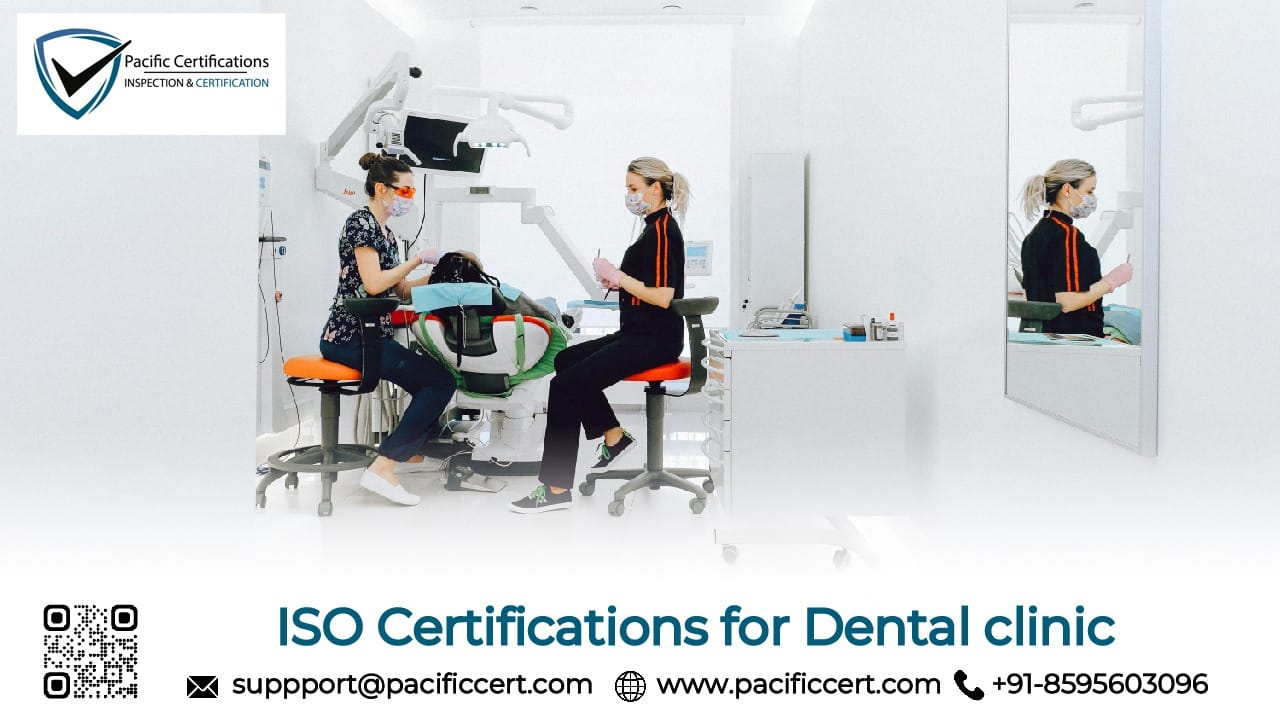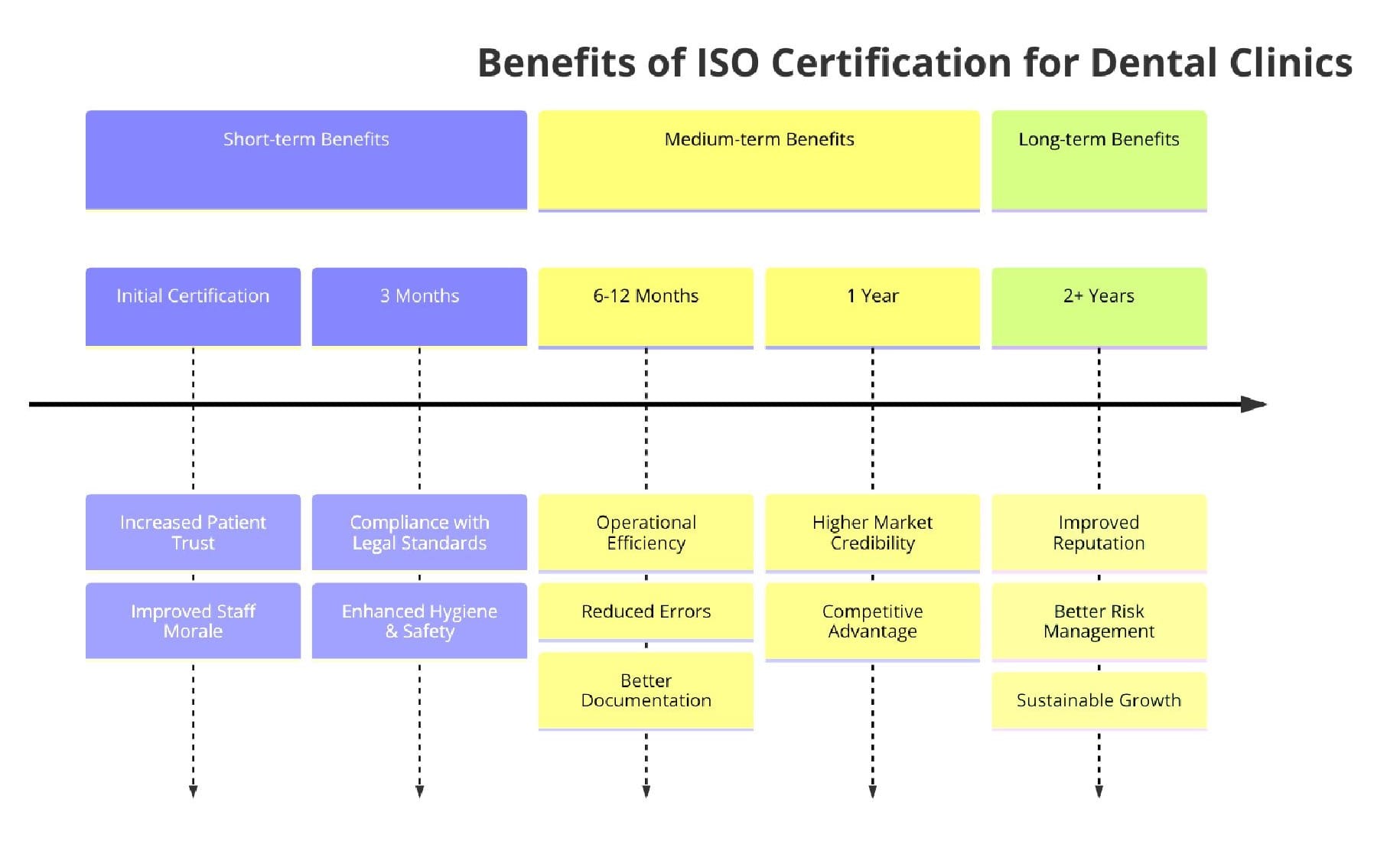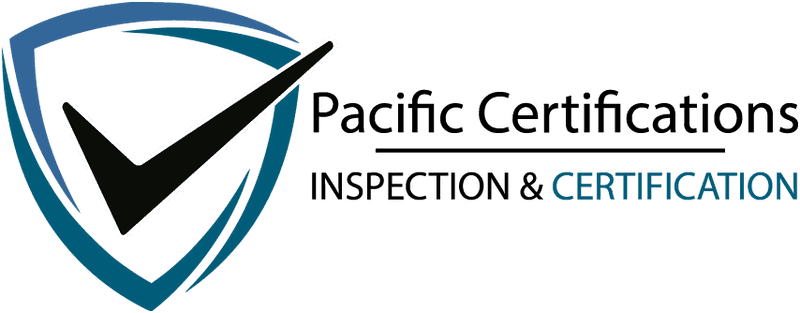ISO Certifications for Dental Clinics, Requirements and Benefits

Introduction
Dental clinics play a vital role in maintaining public health, combining medical expertise with patient trust, safety and hygiene. From small private practices to large dental hospitals, the sector is under increasing scrutiny from health authorities, patients and insurance providers to prove consistent quality, safety and regulatory compliance.
ISO certifications provide a structured way for dental organizations to demonstrate excellence. They help standardize procedures, ensure patient safety, protect data and promote sustainable and ethical clinical practices. A certified clinic builds confidence among patients that every treatment is delivered under a globally recognized management system.
Every smile begins with trust, ISO certification helps dental clinics prove that quality, safety and care are part of their daily practice.
Send your inquiries to [email protected], and our team will assist you with the certification process.
Quick summary
ISO certifications enhance the quality, safety and sustainability of dental clinics. They build patient confidence, improve hygiene and process control, protect digital records and ensure global credibility. Certified clinics stand out as reliable and patient-centered healthcare providers.
Applicable ISO Standards for Dental Clinics
Several ISO standards are relevant to dental clinics, covering aspects like quality management, patient safety, environmental responsibility, and data security. Here are the key ISO certifications applicable to dental practices:
ISO 9001:2015 – Quality Management System (QMS)
ISO 9001 is the most widely recognized quality management standard. It helps dental clinics implement a structured approach to patient care, reduce errors, and improve overall service quality. This standard ensures continuous improvement, efficient workflow management, and enhanced patient satisfaction.
ISO 13485:2016 – Medical Devices Quality Management System
This standard is crucial for dental clinics that use medical devices and equipment. ISO 13485 focuses on maintaining the quality, safety, and performance of dental instruments, ensuring compliance with regulatory requirements for medical devices.
ISO 14001:2015 – Environmental Management System (EMS)
Dental clinics generate biomedical waste, including used gloves, syringes, and chemical substances. ISO 14001 helps clinics implement sustainable practices for waste management, reducing environmental impact and complying with local environmental regulations.
ISO 45001:2018 – Occupational Health and Safety Management System
The safety of dental professionals, staff, and patients is a top priority. ISO 45001 provides a framework for identifying workplace hazards, reducing risks, and creating a safe working environment. This is particularly relevant for infection control, radiation exposure, and chemical handling in dental clinics.
ISO 27001:2022 – Information Security Management System (ISMS)
With the rise of digital record-keeping, protecting patient data is more important than ever. ISO 27001 helps dental clinics secure sensitive information, prevent cyber threats, and comply with data protection regulations like HIPAA and GDPR.
ISO 15189:2022 – Medical Laboratories – Requirements for Quality and Competence
For dental clinics that have in-house laboratories, ISO 15189 ensures accurate test results, proper calibration of equipment, and adherence to stringent quality control measures.
Click here to find out more applicable standards to your industry
How Pacific Certifications can help?
Pacific Certifications, accredited by ABIS, provides independent and globally recognized audit and certification services for dental clinics, hospitals and healthcare providers. Our team of auditors has hands-on experience in medical and dental environments, ensuring that your clinic meets the highest international standards.
We can help with:
Certification for ISO 9001, ISO 13485, ISO 45001, ISO/IEC 27001, ISO 15189 and ISO 14001.
Integrated audits covering quality, safety and data security in one system.
Multi-site and hospital network certifications.
Partnering with Pacific Certifications means:
Transparent audits with zero consultancy bias.
Clear guidance through every stage of assessment.
Recognition in over 150 countries for your certification.
To begin your certification process with confidence and professionalism. Contact us today at [email protected].
What are the requirements of ISO Certifications for Dental Clinics?
Each ISO standard applicable to dental clinics has specific requirements. Below is a breakdown of key requirements for each standard:

General requirements:
Standardized Clinical Procedures: All treatments, from sterilization to patient diagnosis, must follow documented procedures that guarantee consistency and safety.
Patient Record Management: Implement a system for secure and accurate documentation of medical histories, treatment plans and consent forms, ensuring compliance with data protection laws.
Infection Control and Hygiene: Maintain clean work environments through proper sterilization, disinfection and waste management according to ISO 45001 and ISO 14001 principles.
Quality Policy and Objectives: Define quality goals focused on patient satisfaction, clinical excellence and continuous improvement.
Risk Management: Identify clinical and operational risks such as infection, radiation exposure and patient complaints and apply corrective measures promptly.
Staff Competence and Training: Provide ongoing training for dentists, assistants and technicians on new techniques, safety and equipment handling.
Equipment Calibration and Maintenance: Schedule regular calibration of dental chairs, autoclaves, imaging systems and other devices to maintain precision and safety.
Internal Audits: Conduct periodic audits to check compliance with ISO procedures and identify areas for improvement.
Management Review: Clinic management should review performance data, feedback and nonconformities to enhance overall service quality.
Data and Information Security: Apply secure systems to protect patient confidentiality in accordance with ISO/IEC 27001 guidelines.
These requirements ensure a well-organized, safe and patient-focused dental practice ready for ISO certification.
Specific requirements: ISO 9001:2015 – Quality Management System (QMS)
Develop a documented quality management system (QMS).
Implement a patient-centered approach to care.
Establish clear policies for service delivery and complaint handling.
Conduct internal audits and continuous improvement activities.
ISO 13485:2016 – Medical Devices Quality Management System
Maintain strict control over medical devices and dental instruments.
Ensure proper sterilization and calibration of equipment.
Implement risk management for device-related hazards.
Maintain traceability of medical supplies and equipment.
ISO 14001:2015 – Environmental Management System (EMS)
Identify and manage environmental risks associated with dental waste.
Implement proper disposal methods for biohazardous and chemical waste.
Reduce water and energy consumption within the clinic.
Comply with environmental regulations and sustainability goals.
ISO 45001:2018 – Occupational Health and Safety Management System
Identify workplace hazards (e.g., radiation exposure, infection control).
Implement safety protocols for staff and patients.
Conduct regular risk assessments and emergency preparedness drills.
Provide protective equipment and workplace safety training.
ISO 27001:2022 – Information Security Management System (ISMS)
Protect patient records and sensitive health data.
Implement cybersecurity measures to prevent data breaches.
Control access to patient information and ensure confidentiality.
Conduct regular security audits and risk assessments.
ISO 15189:2022 – Medical Laboratories – Quality and Competence
Maintain accurate and reliable diagnostic testing procedures.
Ensure proper calibration of laboratory equipment.
Implement quality control measures for laboratory operations.
Maintain staff competency through ongoing training.
Begin with a gap analysis to compare your clinic’s current systems with ISO requirements. Prioritize infection control, patient feedback systems and data security. Assign a coordinator to oversee documentation and internal audits to ensure a smooth transition to certification.
Each of these standards helps dental clinics enhance quality and compliance. We at Pacific Certifications conduct independent audits and issue certificates. Contact us at [email protected] to get started!
What are the benefits of ISO Certifications for Dental clinics?
Achieving ISO certification brings numerous advantages to dental clinics, enhancing their operations and reputation. Below are the key benefits:

Certification shows patients that the clinic operates under verified quality and safety standards.
ISO 45001 and ISO 14001 improve hygiene, waste management and overall biosafety.
ISO certification helps align with local and international health regulations and licensing standards.
ISO/IEC 27001 ensures secure handling of patient records and digital imaging data.
Standardized processes reduce errors, waiting times and treatment inconsistencies.
Well-trained and safety-conscious staff perform better, creating a positive work environment.
Efficiency: ISO 50001 supports the use of sustainable resources and lowers operational costs.
Certified clinics attract more patients, insurance partners and institutional collaborations.
Regular audits and management reviews drive long-term progress in service quality.
ISO certification enables dental clinics to align with international health and quality frameworks, improving competitiveness.
Market Trends
The global dental industry has experienced remarkable growth, valued at over USD 36 billion, with rapid expansion in preventive and cosmetic dentistry. Patients are more informed and selective than ever, often choosing certified clinics that can demonstrate reliable hygiene and treatment consistency.
Governments and insurance providers increasingly prefer ISO-certified healthcare and dental facilities for quality assurance. Moreover, the rise of digital dentistry using CAD/CAM systems, 3D imaging and electronic records has made ISO/IEC 27001 crucial for protecting digital assets.
Sustainability is also shaping dentistry, with clinics adopting ISO 14001 and ISO 50001 to minimize environmental impact through proper waste segregation, energy-efficient lighting and water-saving technologies.
Overall, ISO certifications are becoming a mark of professionalism and accountability in modern dental care.
If you need support with ISO certification for your Dental Clinic, contact us at [email protected] or +91-8595603096.
Author: Ashish
Ready to get certified?
Contact Pacific Certifications to begin your certification journey today!
Suggested Certifications –
Read more: Pacific Blogs

